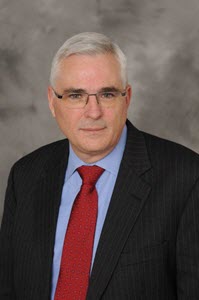You are now leaving XTANDI.com
The website you are about to visit is not owned or controlled by Astellas. Astellas are not responsible for the information or services on this site.
Feb 10, 2016
 |
Dr. Jeff Bloss, Senior Vice President, Astellas Medical Affairs, Americas, Astellas Pharma Global Development, Inc.
There’s a common saying – “you’re only as good as your data.” In the ongoing shift from volume to value in health care, this adage couldn’t be more relevant.
Payers, physician groups, engaged patients, biopharmaceutical companies are all focused on value and related frameworks. But as these frameworks are evaluated and put into place, we need appropriate guardrails that preserve evidence-based decision-making by patients and physicians.
Judgments about the value of a treatment are highly individualized, and they change over time as new research and treatment options emerge. We must use all our available tools to reach such judgments – including real-world evidence.
Understanding how treatments work in the real world is vital for providers, health plans and biopharmaceutical companies. Doctors want to make the best possible treatment decisions for their patients, guided by timely and tested information. Pharmaceutical innovators strive to continually enhance the medicines they develop, seeking out new ways to improve patient outcomes.
Payers want to know more about real-world patient experiences, and they seek health care economic data. However, lingering ambiguities in related regulations serve as a deterrent not only for sharing such information, but for collecting it in the first place.
The 21st Century Cures legislation passed last year by the House of Representatives took steps toward clarifying FDA’s current regulations which, due to their vague and somewhat ambiguous nature, prevent companies from sharing certain accurate, data-driven information with payers and formulary committees to inform coverage and patient care. That’s encouraging – and we hope the Senate continues to focus on improving health outcomes through more informed clinical practice.
In the meantime, at Astellas, we’re looking at new ways to bring better value to our customers and patients – and real-world evidence is a key component.
For example, we are working with Medivation on a prospective patient registry to better understand the unique needs of patients with castration-resistant prostate cancer (CRPC). The registry – called TRUMPET – is enrolling and evaluating 2,000 patients diagnosed with CRPC from urology and oncology sites across the country. We will follow patients and participating caregivers for up to six years to gather information about the management of CRPC, including patterns of care and treatment decisions and settings. The registry does not evaluate any specific medicine, but focuses on quality-of-life patterns.
The insights gleaned from TRUMPET can impact our research approach and increase our understanding of important treatment considerations – reflecting our commitment to provide effective, evidence-based care for cancer patients and their caregivers.
Of course, real-world evidence also has significant applications in the development of new medicines. Randomized, controlled clinical trials have long been the primary source of data and the gold standard for establishing the safety and efficacy of investigational medicines. Such trials are designed to target specific patient populations and to address the important questions of safety and efficacy in that controlled setting.
However, once a medicine is approved by FDA and prescribed by physicians, many additional patients receive the drug outside of a controlled environment.
These “real-world” patients offer hugely valuable safety and efficacy information that goes beyond the information generated in a controlled clinical trial.
Real-world evidence allows us to examine broader information on the use of medicines. We can learn new details about how a patient responds that can be incredibly meaningful over time.
Such information has been used by FDA to inform safety-related decisions, but has typically not been used to evaluate the benefits of a medicine.
In comments on 21st Century Cures, the Pharmaceutical Research and Manufacturers of America (PhRMA) supported an expansion of FDA’s ability to make decisions on the therapeutic benefits of a medicine based on real-world evidence.
They suggested and we agree that such a policy shift is overdue, and could have a profound impact on the efficiency of drug development. It would appropriately reflect our technological capabilities, and, most importantly, it would benefit patients seeking new options to battle disease.
The digitization of health care information is changing the way we do business. It’s enabling us to better identify what works, for whom – and what doesn’t and why.
Tapping into real-world data not only can help establish the value of an individual medicine, it also provides us with much more. It helps inform our R&D. It provides better insights into disease states. It demonstrates how well standards of care work.
Now is the time to create a modernized regulatory framework that encourages the development and dissemination of accurate, data-driven information – including real world evidence – to achieve high-quality, high-value patient care.
This website is intended for U.S. residents only. This website contains information about products that may not be available in all countries, or may be available under different trademarks, for different indications, or in different dosages. Nothing contained herein should be considered a solicitation, promotion or advertisement for any drug including those under development. Any information on the products contained herein is not intended to provide medical advice nor should be used as a substitute for the advice provided by your physician or other healthcare provider.
The site uses cookies to provide you with a more responsive and personalized service and to analyze site traffic. By using this site, you accept our use of cookies as described in our privacy policy. Please read our privacy policy for more information on the cookies we use, the processing of your personal data and how to delete or block the use of cookies.